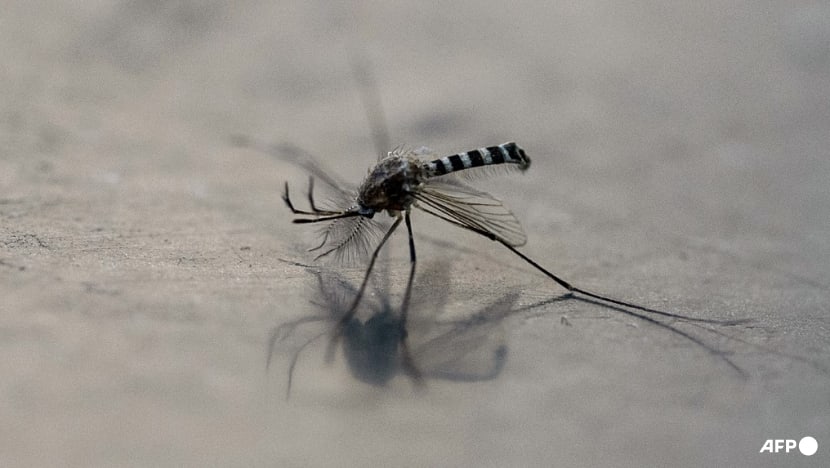What is Zika and what are the health risks?
How is the Zika virus transmitted and what can you do to protect yourself?

An Aedes aegypti mosquito is pictured on a surface on Dec 2, 2024. (File photo: AFP/Yuri Cortez)

This audio is generated by an AI tool.
SINGAPORE: Authorities are urging pregnant women in Woodlands to take precautions following the confirmation of two Zika cases there on Thursday (Jun 19).
The National Environment Agency said that it found "persistent Zika virus signals" after conducting mosquito and wastewater surveillance in the area where the cases were detected, which suggests that it is likely to have Zika transmission.
But what exactly is Zika, and how does it affect you?
WHAT IS ZIKA?
Similar to dengue, Zika is a virus infection that is spread by the Aedes mosquito.
According to Singapore's Communicable Diseases Agency (CDA), about 20 per cent of people infected with Zika display symptoms, and while Zika infections are generally mild, they can cause neurological complications or abnormalities in foetuses.
There is no specific vaccine or treatment for Zika, though its symptoms can be managed as they present themselves.
Pregnant patients should be referred to an obstetrics and gynaecology doctor so that their condition can be further managed, CDA said.
HOW IS ZIKA TRANSMITTED?
The Zika virus is transmitted to people primarily through the bites of an infected Aedes mosquito.
A pregnant infected woman can also pass the Zika virus to her foetus during pregnancy. This is especially dangerous, as it can cause birth defects.
Zika can also be passed through sex from an infected person to his or her partners, even if that person is not showing any symptoms at the time of the sexual activity.
WHAT ARE THE SYMPTOMS?
Most people with Zika do not develop symptoms or will only have mild symptoms. In one in five cases, they may have the following symptoms:
- Fever
- Rash
- Joint pain
- Muscle pain
- Headache
- Conjunctivitis (red eyes)
Symptoms usually appear within three to 14 days of being bitten by an infected Aedes mosquito, CDA said, and can last between four and seven days.
Because Zika symptoms are usually mild and people usually do not get sick enough to go to the hospital, many people do not even realise they have been infected, according to the United States Centers for Disease Control and Prevention (CDC).
Listen:
WHAT ARE THE HEALTH RISKS OF ZIKA?
The CDA said there is currently no evidence that pregnant women are more likely to get a Zika virus infection.
However, Zika infection during pregnancy can cause serious birth defects such as microcephaly. Babies with microcephaly usually have smaller heads than usual, and smaller brains that did not develop properly, said the CDC.
"Zika virus infection during pregnancy can cause birth defects of the brain or eye. These birth defects can occur alone or with developmental problems in a particular pattern called congenital Zika syndrome," said the CDC.
Apart from microcephaly, a baby with congenital Zika virus infection may also have:
- Problems with brain development
- Feeding problems, such as difficulty swallowing
- Hearing loss and vision problems
- Seizures
- Decreased joint movement
- Stiff muscles, which impair movement
"Not all babies born with congenital Zika syndrome will have all of these conditions," said the CDC. "Some infants who do not have microcephaly at birth may develop it later. In addition, some babies might look healthy at birth but can develop long-term health problems as they grow."
Zika infection in pregnancy can also cause complications such as foetal loss, stillbirth and pre-term birth.
In adults and children, Zika infection has been found to be strongly associated with Guillain-Barre syndrome (GBS), an uncommon sickness in which a person's own immune system damages their nerve cells, causing muscle weakness and sometimes paralysis. These symptoms can last for a few weeks or several months.
However, only a small proportion of people with recent Zika infection get GBS, the CDC said. Most people fully recover from GBS, though some may have permanent damage.
"Very few people die from GBS caused by Zika infection," it said.
CDC added that in rare cases, Zika may cause severe disease affecting the brain, causing swelling of the brain (encephalitis), tissues around the brain (meningitis) or spinal cord (myelitis). Zika may also cause a blood disorder which can lead to bleeding, bruising or slow blood clotting.
PREVENTING ZIKA TRANSMISSION
As Zika is primarily spread through the bites of Aedes mosquitoes, measures taken to combat dengue and prevent the breeding of mosquitoes remain the most effective ways to limit Zika infections.
CDA advises members of the public to take protective measures such as removing stagnant water at home and workplaces to prevent mosquito breeding.
People can also apply insect repellent and wear long, covered clothing. They can also sleep under mosquito nets or in rooms with wire-mesh screens or air-conditioned rooms to keep mosquitoes at bay.
Those who are infected are advised to either abstain from sexual intercourse temporarily, or to practice safer sex through the use of condoms.
















